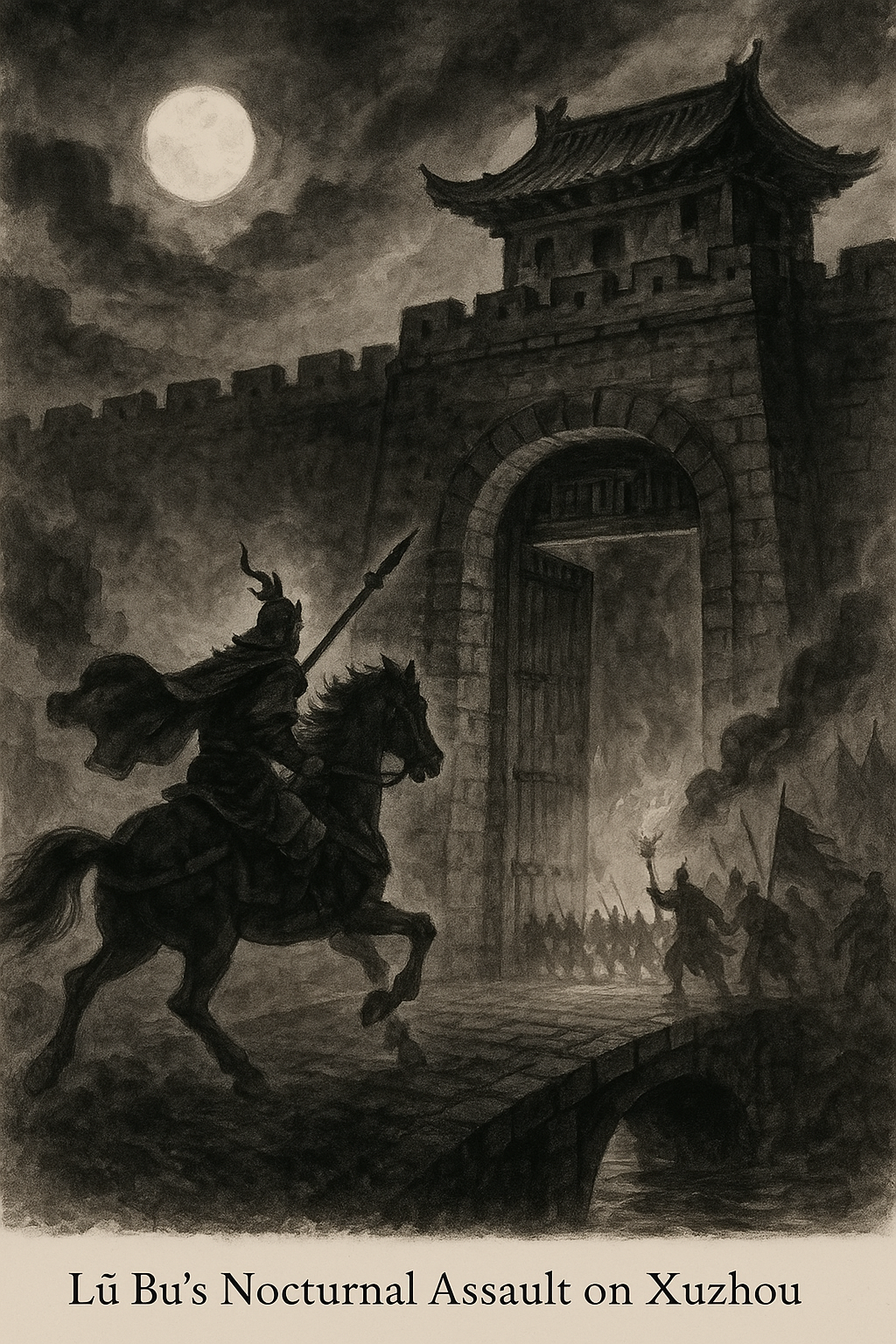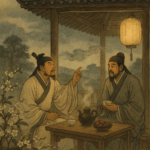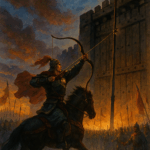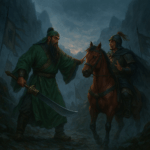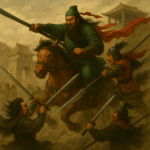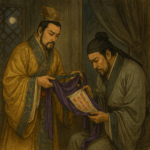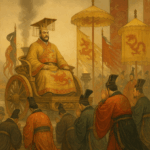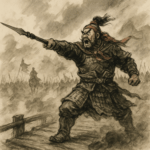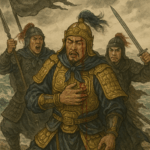Li Le, feigning to be Li Jue and Guo Si, led his troops against the imperial carriage. Alarmed, Emperor Xian cried, “This is Li Le himself!” He ordered Xu Huang to intercept. In single combat, Xu Huang’s axe felled Li Le from his horse; the rebel detachment shattered, and the Emperor’s party passed safely through Jiyu Pass. Governor Zhang Yang marshaled grain and silk at Zhidao to welcome the Emperor, who ennobled him Grand Marshal. Zhang declined and encamped at Yewang.
When Emperor Xian returned to Luoyang, he found the palaces razed and the marketplaces overgrown with weeds. Only crumbling walls remained of the former grandeur. He commanded Yang Feng to erect a small palace for the court. On the first day of Jian’an (formerly Xingping), the famine renewed. Only a few hundred households remained; many foraged for tree bark and roots beyond the city walls. Even lowly clerks of the Secretariat joined the woodcutters—some perished among the ruins. So ended the Han’s final vitality. A later poet lamented:
Blood flows from Mangdang, the White Serpent’s reign is done,
Red banners crisscross the land with none to guide them home.
The stag of Qin pursues the state’s demise through shifting fate,
The swan of Chu pushes down the borders once so proud.
Seeing both capitals in ruin, thievery rampant,
not even iron men could hold back despair.
The Grand Commandant Yang Biao petitioned the Emperor: “Your earlier edict to summon Cao Cao has yet to be carried out. Now that he controls Shandong with great armies and gallant generals, we should recall him to court to bolster the throne.” Emperor Xian replied, “My edict stands—send the summons at once.” Yang Biao duly departed for Shandong.
In his camp, Cao Cao rejoiced at the news of the Emperor’s return to Luoyang. His strategist Xun Yu urged, “When Duke Wen of Jin received Zhou Xiangwang, the lords submitted in gratitude; when Emperor Gaozu mourned Lord Yuwen, all under heaven embraced him. Now, the Son of Heaven lies in the dust—this is our moment to raise righteous armies and escort him back. If we delay, another will seize the opportunity.” Cao Cao immediately ordered his legions to prepare—but just then a celestial envoy arrived, bearing the imperial summons. Cao Cao received the edict and set the date to march.
Emperor Xian still lacked supplies and defenses, and reports came that Li Jue and Guo Si’s armies were approaching. In alarm he asked Yang Feng, “Our envoy to Shandong has not returned, yet Li and Guo’s forces close in. What shall we do?” Yang Feng and Han Xian offered to fight to the death in the palace courtyard, but Dong Cheng counseled, “Our walls are shattered, our arms few. If we fail, what next? Better to escort the Emperor east to Shandong and await Cao Cao’s arrival.” The Emperor agreed, and at dawn the procession set out—ministers and courtiers alike walking on foot.
Dust rose like a pall, and the thunder of drums echoed as thousands of soldiers streamed past. The Emperor and Empress could only stare in mute dread. Suddenly a lone rider galloped through the ranks: he was the envoy sent to Shandong, who bowed before the carriage and announced, “General Cao has mustered all Shandong troops at the imperial summons. He feared Xu Huang alone would not suffice, so he dispatched Xiahou Dun—and ten senior officers with fifty thousand crack troops—to escort Your Majesty.” Comforted, the Emperor pressed on.
Moments later, Xiahou Dun arrived with Xu Chu and Dian Wei in his train, presenting military salute. No sooner had the Emperor returned their greeting than scouts reported another detachment coming from the east. Inquiries revealed it was Cao Hong, Li Dian, and Le Jin. They explained, “We feared Xiahou Dun’s force might be too small, so we rode double-time.” Emperor Xian declared, “You are truly loyal ministers!” and ordered them to ride ahead in his defense.
When new scouts warned, “Li Jue and Guo Si’s armies drive toward us,” the Emperor commanded Xiahou Dun to split his force. He led one wing with Cao Hong, the other with Xiahou Dun; the cavalry rode out frontward, the infantry following. The rebel columns collided with them, and in the ensuing battle over ten thousand heads fell from their shoulders. Victorious, the Emperor returned to Luoyang’s old palace, while Xiahou Dun camped outside the walls.
On the next day, Cao Cao’s main army arrived. He entered Luoyang, knelt on the palace steps before the Emperor, who granted him audience and bestowed consolations. Cao declared, “I have long cherished the dynasty’s grace. Li Jue and Guo Si’s crimes cry for vengeance—allow me to marshal my two hundred thousand troops and restore order.” Emperor Xian appointed him Inspector-General of the Capital Region, conferring upon him the authority of a general and regent.
Li Jue and Guo Si, hearing Cao’s approach, vowed to meet him in battle. Jia Xu urged against it: “Their troops are fierce—better to coax them into surrender than destroy them.” Li Jue flew into a rage, nearly slaying Jia Xu, but his officers restrained him. That night Jia Xu slipped away to his native home.
When Li Jue’s army came to confront Cao, Cao Cao first sent Xu Chu, Cao Ren, and Dian Wei—three hundred iron cavalry—through the rebel lines three times before setting his own formation. In the ensuing mêlée, Li Jue’s nephew Li Xian and Li Bie rode forth, only to be cut down by Xu Chu’s blade. Cao Cao slapped Xu Chu on the back: “You are my own Ban Chao!” He then led the center, with Xiahou Dun and Cao Ren on the flanks. At his signal, all three armies surged forward; the rebels broke and fled. That night Cao Cao pursued relentlessly, slaying countless foes. Li Jue and Guo Si, routed and leaderless, fled into the hills. Cao Cao returned to his camp outside Luoyang.
Yang Feng and Han Xian, fearing Cao’s power would soon eclipse their own, entered the palace and petitioned the Emperor under the pretext of hunting down Li Jue and Guo Si. They seized their troops and moved to Daliang, leaving the Emperor in Cao’s hands.
Meanwhile, the imperial session at Cao’s camp brought Cao face to face with an envoy named Dong Zhao—a scholar of bright countenance but lean frame. Astonished by his vitality amid famine, Cao joked, “By what regimen do you remain so hale?” Dong Zhao replied, “I have subsisted on barely seasoned food these thirty years.” Cao nodded and inquired of his post. Dong Zhao introduced himself as a former retainer of Yuan Shao and Zhang Yang, now named Zhengyi Lang and appointed “Proper Clerk.” Impressed by his candor, Cao Cao entertained him and arranged for a meeting with Xun Yu. When warned of troops marching toward Daliang, Dong Zhao assured him they were merely Yang Feng and Han Xian withdrawing. Cao Cao smiled: “No need to fear those scoundrels”—thus Dong Zhao won his trust.
That night, Dong Zhao secretly urged the move of the capital to Xuchang. He pointed to astrological omens and the strength of the land: “The Emperor’s mandate has waned; the soil of Xuchang is ready to nurture a new dynasty.” Cao Cao accepted his counsel. The next day he formally petitioned Emperor Xian: “Luoyang lies in ruins, supply lines strained. I pray Your Majesty to relocate to Xuchang, near Luyang, where cities stand ready and granaries full.” The Emperor, cowed by Cao’s authority, dared not refuse. At a chosen dawn, the procession set out, with Cao Cao’s legions as escort.
Before long, they reached a high ridge where Yang Feng and Han Xian blocked the road. Xu Huang rode forward to confront them, shouting, “Cao Cao seeks to usurp the throne—how dare you!” Impressed by Xu Huang’s bearing, Cao Cao ordered Xu Chu to engage him. They fought fifty exchanges without resolution. Cao Cao then called a halt and conferred with his advisers: “Yang Feng and Han Xian can be handled. Xu Huang is a true general—let us win him by guile.” Man Chong volunteered: “Allow me to enter his camp disguised as a common soldier; I will persuade him to join us.” Cao Cao eagerly agreed.
That night Man Chong slipped into Xu Huang’s quarters and called out, “Old friend, long time no see!” Xu Huang recognized him at once: “You are indeed Man Boyue of Shanyang! What brings you here?” Man Chong declared, “I serve General Cao now. Having seen your prowess on the field, I could not bear to see you fight me to the death. General Cao values brave men like you—will you not defect and achieve greatness together?” Xu Huang reflected and sighed, “I have long doubted Yang Feng and Han Xian—they are not builders of empires. Yet I have been bound to them through long service and could not leave.” Man Chong pressed on: “Great birds choose perfect trees; wise ministers choose worthy lords. To hesitate here is not the way of a man of ambition.”
Moved, Xu Huang agreed—but refused to slay his former comrades. Instead, he led a few dozen riders that very night to Cao Cao’s camp. When Yang Feng learned of Xu Huang’s defection, he charged with a thousand cavalry, screaming, “Traitor Xu Huang, stop!” In the clash, Cao Cao’s hidden troops burst from ambush, and Cao himself led the counterattack: “I have awaited you!” Yang Feng’s force collapsed; Han Xian fled to Yuan Shu.
Cao Cao welcomed Xu Huang into his tent and honored him greatly. He then escorted the imperial carriage into Xuchang, where he began rebuilding palaces, temples, government offices, and city walls. He enfeoffed Dong Cheng and twelve others as marquises and rewarded or demoted officials as he saw fit. Cao Cao became Grand General and Marquis of Wuping, with Xun Yu as Chief Councillor, Xun You as Military Adviser, Guo Jia as Chancellor of Literature, Liu Ye as Minister of Works, and dozens of others in key posts. Henceforth all state affairs were first reported to Cao Cao, then to the Emperor.
With his power secure, he convened his strategists: “Liu Bei holds Xuzhou in name, and Lü Bu—recently defeated—has taken refuge there. If they join forces, they will threaten the realm. What do you advise?” Xu Chu boasted, “Give me fifty thousand elite troops; I will bring them their heads on a single spear.” Xun Yu cautioned restraint: “Xuchang is newly pacified—no rash campaign. I propose the ‘Two Tigers’ stratagem: first grant Liu Bei official title as Governor of Xuzhou; then secretly dispatch him orders to kill Lü Bu. Should it succeed, Lü Bu falls. Should it fail, Lü Bu will eliminate Liu Bei. Either way, we prevail.” Cao Cao approved and sent an imperial decree to Liu Bei, naming him Governor of Xuzhou, with a private letter to slay Lü Bu.
In Xuzhou, Liu Bei prepared to offer congratulations on the Emperor’s move when envoys arrived with official commission. They read the private letter, and Liu Bei convened his officers. Zhang Fei urged, “Lü Bu is a faithless rogue—let us strike him now!” But Liu Bei replied, “He comes to us in defeat. To kill him would be no less unchivalrous.” Zhang Fei grumbled but yielded.
The next day Lü Bu came to pay respects. Liu Bei received him courteously. Zhang Fei, however, drew his spear and leapt forward, crying, “I will kill you now!” Liu Bei and Guan Yu restrained him. When Lü Bu asked, Zhang Fei snarled, “Cao Cao says you are faithless. My brother must kill you!” Again Liu Bei intervened, explaining that Cao’s scheme aimed to set them against each other and reap the profit. Moved, Lü Bu bowed thrice and accepted Liu Bei’s assurances.
Messengers were sent back to Cao Cao with offers to delay action. Cao Cao, on receiving Liu Bei’s refusal to kill Lü Bu, consulted Xun Yu: “What now?” Xun Yu proposed the “Wolves Devouring Tigers” plan: slip word to Yuan Shu that Liu Bei plans to seize southern Jing with imperial sanction. Yuan Shu would dispatch a great host against Liu Bei; Cao Cao would in turn summon Liu Bei’s troops to quell Yuan Shu, leaving Lü Bu friendless and distrusted—thus assuring his downfall. Cao Cao dispatched communications to both courts.
In Xuzhou, news arrived that Cao Cao had commissioned Liu Bei to attack Yuan Shu. Though Mi Zhu warned it was another ploy, Liu Bei bowed to the imperial will. Summoning his three sons of war—Guan Yu, Zhang Fei, and Zhao Yun—he rode south toward Nanyang. Sun Qian remained as deputy with Chen Deng to govern Xuzhou.
Yuan Shu, enraged by Liu Bei’s appointment, mobilized General Ji Ling with a hundred thousand men to assault Xuzhou. At Xuyi, facing a superior force, Liu Bei encamped by river and mountains. Ji Ling charged, roaring threats, but Liu Bei replied, “I ride under the Emperor’s orders—here I stand!” Guan Yu leapt forth, engaging Ji Ling in thirty exchanges to a stalemate, then withdrew. Ji Ling sent his lieutenant Xun Zheng to fight. Guan Yu challenged Xun Zheng in single combat and slew him on the spot. Liu Bei’s cavalry then routed Ji Ling’s army; the remainder fled to Huaiyin.
Back in Xuzhou, Zhang Fei handed day-to-day governance to Chen Yuanlong and hosted a grand banquet. Tipsy, Zhang Fei urged every official to drink deeply “to steel themselves for guarding the city.” Cao Bao, refusing, was whipped fifty lashes. Humiliated, he fled that very night to Xiaopei and petitioned Lü Bu for refuge, denouncing Zhang Fei’s brutality and urging Lü Bu to strike Xuzhou while Zhang Fei was drunk. Lü Bu and Chen Gong agreed. Under moonlight, Lü Bu led five hundred horsemen to seize the gate by secret signal; Cao Bao opened the door and the rebels poured in.
Zhang Fei was roused from his stupor, grabbed his spear, and charged with only a dozen retainers. Lü Bu held back, unwilling to press the attack on a drunkard. An escort of eighteen riders protected Zhang Fei as he escaped eastward. Meanwhile Cao Bao, doubtless seeking revenge, gathered a hundred men and pursued Zhang Fei to the riverbank. Zhang Fei, the haze of wine still clinging to him, faced down Cao Bao and struck him through the heart—man and horse collapsed in the current.
Zhang Fei then rallied his dozen horsemen and rode forty li to Xuzhou to warn Liu Bei of the nocturnal assault. The court was aghast, but Liu Bei remained calm: “What we gained, we lose; what we lost, we mourn.” Guan Yu asked after their wives; Zhang Fei replied, “They are all trapped in the city!” Liu Bei fell silent. Guan Yu stamped his foot in fury: “When you were entrusted with the defense, what did you decide? Our fortress is lost, and our wives held captive—what shall we do?”
Zhang Fei, realizing his folly too late, drew his sword to end his own life.
“So toast to excess, and in that excess, remorse—
With bloodied edge, we rue our brash undoing.”
Their fate—and that of the Han dynasty—hung in the balance.
